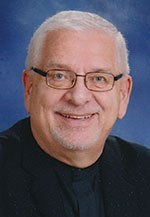Corrections Corner / Deacon Marc Kellams
From start to finish, criminal cases have several steps
 Did you ever wonder how a criminal case gets from arrest to trial? This is how it works in the courts of Indiana.
Did you ever wonder how a criminal case gets from arrest to trial? This is how it works in the courts of Indiana.
When a crime is allegedly committed, it is most often reported to a police agency. If the crime is a felony and the suspected offender is in police presence, and the police have probable cause to believe that the person committed the crime, then the person may be taken into custody. Probable cause is defined as a reasonable ground for belief that the offender violated a specific criminal law.
That police agency prepares a report, which is then sent the following day to the prosecuting attorney’s office. The prosecutor is an elected official and serves as the chief law enforcement officer of each county. He or she handles all cases involving crimes alleged to have been committed in that county. No one, including a judge, can make the prosecutor file a charge, and unless there is a legal defect in the filing. no one can force the prosecutor to dismiss a charge.
If the person is taken into custody, a formal determination of probable cause must be made by a “neutral and detached” magistrate within 72 hours of arrest or the person is released. If the alleged offender was not arrested at the scene, then the probable cause determination must be made to issue a warrant for that person’s arrest. This applies to both felonies and misdemeanors. Most minor offenses result in release on the person’s own recognizance, or if not initially arrested, a summons may be issued requiring them to appear in court.
Presuming the accused is arrested on a warrant, they are brought before the court in the next day or two for an initial hearing. At that hearing, the person is formally advised of the charges brought against them, the penalties upon conviction of those charges, and the person’s constitutional rights, which are: the right to maintain a plea of not guilty and have a public and speedy trial by jury; the right to be present and face any accusers who might testify against them and the right to cross examine them; the right to require witnesses to appear to testify in their own behalf; the right to require the state to prove their guilt beyond a reasonable doubt before they can be convicted; and the right to remain silent and not be forced to testify against themselves at any hearing or trial.
Reasonable doubt means, in simple terms, that a judge or juror may not find a person guilty of a crime unless they are “firmly convinced” of the defendant’s guilt. The person also has the right to have an attorney appointed for them if they cannot afford to hire an attorney.
Finally, if the person remains in custody, the issue of bail may be considered or if the prosecutor objects and requests more time to investigate the alleged crimes and the incarcerated person’s prior criminal history, the court may reset it for a bail hearing. The judge will usually set a pretrial, and often a trial date.
More to come in future columns.
(Deacon Marc Kellams is the Coordinator of Corrections Ministry for the Archdiocese of Indianapolis. He can be reached at mkellams@archindy.org or call 317-592-4012.) †
Interested in prison ministry? Here’s how to get more information
In the May 27 Corrections Corner column, we inadvertently left off contact information for anyone interesting in learning more about volunteering for prison ministry at the Terre Haute Federal Penitentiary.
Richard Hoying, a member of
St. Thomas More Parish in Mooresville, has taken over the coordinator’s role for volunteers at the prison.
“The need is great,” he wrote in his May column, “and now there is a long waiting list that has built over the two years of COVID.”
To contact Hoying, call 317-752-7230, or e-mail him at rhoying@indy.rr.com. †
 Did you ever wonder how a criminal case gets from arrest to trial? This is how it works in the courts of Indiana.
Did you ever wonder how a criminal case gets from arrest to trial? This is how it works in the courts of Indiana.